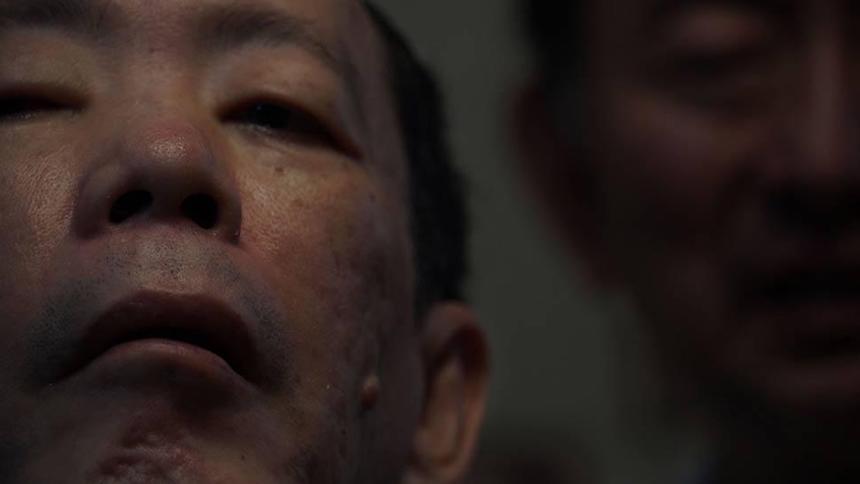Sitges 2017 Review: CANIBA Challenges You To Take A Long Look At A Murderer

And now for something truly different. Unconventional in almost every way, Caniba is the latest anthropological and psychological inquest from Véréna Paravel and Lucien Castaing-Taylor. Their previous film, Leviathan, made for the Harvard Sensory Ethnography Lab wordlessly looked at the functioning of a long range fishing vessel often from the point of view of the of the dead fish or the birds flying overhead. With Caniba, the film is a lengthy dialogue with convicted murderer and cannibal Issei Sagawa, now in his late 60s and and his brother Jun, but it is shot in lengthy extreme, often unfocused close-up that is fascinating, challenging in ways that are uncomfortably voyeuristic.
Consider the relationship between sex and food. Or sex and death. In France there is an expression for the sensation of an orgasm, la petit mort, the little death. Sexual appetites and fetishes are strange and at odds, generally, in how we present ourselves to the world. But as Jim Morrison said, “people are strange.”
In early 1980s, Issei Sagawa killed and partially consumed the flesh of a young and beautiful Dutch woman, Renée Hartevelt, who was classmate in the Paris school he was attending at the time. She would not date nor have sex with him, Sagawa remembers, but he managed to lure her up to his place for school reasons and crossed every conceivable moral line.
It was a primal sex act that was so extreme and vile that he was sentenced on the grounds of insanity ("One fantasy became bred another until it became a craving, and the thing was right in front of me."), and bounced out of the country. Upon his release and return to Japan, Sagawa went on to make a living on his notoriety, a celebrity of the strangest variety in a country that seems to go out of its way to celebrate strange things in unusual ways. He published a thick manga of the incident, we see pages of this graphic novel at length, in the film, and it is both disturbing and oddly accessible. Briefly he even wrote a food column. There have been several documentaries made on Sagawa in the past, my guess is that they are a mix of informative or sensational TV stuff, and nothing like this one.
Opening with a lengthy disclaimer. Really lengthy. Eyebrow raising, in fact. And then a biblical quotation from the Gospel According to John, you know the one where Jesus said amongst other things, "Very truly I tell you, unless you eat the flesh of the Son of Man and drink his blood, you have no life in you” Caniba takes its time inching towards its subject with the facts of the situation and a broader cultural spirituality. When we do arrive in the small apartment outside of Tokya, the visuals are often obscured and out of focus, as the camera floated around the face and upper body of Issei and his brother who is also his caretaker and only companion.
This pair of elderly men so strange they make the Crumb brothers (if you recall Terry Zwigoff’s excellent documentary on underground comic artist Robert Crumb) look positively normal. Jun himself has been inflicting pain upon himself for sexual purposes for decades, using barbed wire, knives, and at one point taping a lit firework to his bicep and having it blazingly go off. The film meditates on pain and pleasure, sex and harm, specifically and personally with the brothers that at times feel almost in competition with one another along these lines, but the languid pace allows the mind to wander into how this plays out at a larger cultural, human, level.
Sagawa is partially paralyzed, and speaks in slow, deliberate sentence fragments. The filmmaking approach offers what feels like a lengthy day with the pair in which they confess and consider their lives. It is Jun that actually does the bulk of the talking in the film, and his hesitant, occasionally repetitive, diction switches from Japanese to French on occasion He seems as unsettled and repulsed by his brother's life even as he cares for him, there is a measured empathy and reluctance that overlap.
The camera never stands back and sizes up its subject(s), rather it searches for details that will remain unfocused and ethereal. The filmmakers are interested in the headspace and psychology of Sagawas, but equally purported towards making the viewer question the oddity on our own behaviour. When we play with our children pretending to ‘eat them up’ for innocent fun. Or all the licking and sucking involved in human intimacy.
Home video footage of Jun and Issei shown at one point in the film essay a happy normal childhood. Super 8 footage shot during birthday parties and family trips in the 1950s look like any other family you would expect at the time. Video footage of fetishistic pornography is also shown, with pissing and other extreme sex acts.
And yet Caniba often feels like an unlikely love story between brothers, who only have each other at this point and are looking at their own natural deaths on the near horizon. Issei confesses, “I can only love because I have you, brother.” Jun curiously observes that while they do fight, being cramped up together in a small apartment, “We do not apologize, as we would fight even more.”
Caniba will unquestionably be off-putting to the bulk of cinema-goers, be it multiplex weekenders or documentary lovers, those in whatever passes these days as the ‘moral majority’ will predictably claim it exploitative and perverse, too uncomfortably enthralled of its subject. And yet, the intimate and difficult documentation approach taken by Véréna Paravel and Lucien Castaing-Taylor make it one of the most fascinating films of the year.

Do you feel this content is inappropriate or infringes upon your rights? Click here to report it, or see our DMCA policy.






